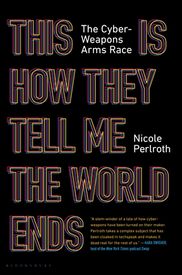This Is How They Tell Me the World Ends

The Cyperweapons Arms Race
by Nicole Perlroth
Completed: July 11, 2021- Other
- 528 pages
- ISBN: 9781635576054
- Goodreads page
The release of atom power has changed everthing except our way of thinking… the solution to this problem lies in the heart of mankind. If only I had known, I should have become a watchmaker.
– Albert Einstein
I think this topic is generally so important that any half decent book on it should get a 4 or 5 star ‘highly recommended’ status. However, this particular book is written too much as ‘pulp trash’ (for lack of a better phrase) that it’s tough to recommend more than 1 or 2 stars. Hence, the middle ground.
To be fair to the author, she claims that the point here is to get the layperson to read (and presumably enjoy / recommend) such a book. And the author thinks (mistakenly, I believe) that ignoring virtually all technical details (or even accuracy) is a small price to pay, and writing a sensationalized, breathless book with a trashy ‘airport novel’ vibe is the way to go.
Examples of some of the frankly terrible writing that the author appears to get away with:
I was reminded of something a female hacker friend had told me late one night when I was still getting my legs under me on this beat. She told me the only way to get a hacker to stop hacking was to marry him off. If only it were that simple.
Calling hackers “pimply thirteen-year olds in their parents’ basements, ponytailed coders from the web’s underbelly….”
Or,
All over Vegas, women in short cocktail dresses watched, dumbfounded, as nerds in black T-shirts screamed at other nerds in corporate logo T-shirts about the ethics of bug payments.
Or,
The three hackers were so worked up, they barely noticed a prostitute approaching their table.
Or, in an attempt to write millenial romance fiction,
I looked down at my iPhone with a renewed sense of intrigue, the kind of look you might give a beautiful stranger.
You get the gist. The first third of the book that I was reading a very poor imitation of a Dan Brown novel.
And the brazen dismissal of a reader’s ability to even try to understand some technical details, here’s a discussion of source code:
But the most sophisticated attackers want the source code, the hieroglyphics created and admired by the engineering class. Source code is the raw matter for software and hardware. It is what tells your devices and apps how to behave, when to turn on, when to sleep, who to let in, who to keep out.
Or, when discussing possible technical inaccuracies pointed out by the NSA in a New York Times story the author co-wrote, she says: “[The NSA official] and others in the exploit trade… seized on the technical detail that in this particular case, the ransomware attack had not spread with EternalBlue.” And “the agency had seized on this one technical detail to avoid responsibility.”
Apparently, nationally renowned journalists making technical flaws in their articles should not be “seized” upon by others.
And unfortunately, the last third is a lot of political preaching which I found only tangentially related to the main topic at hand. The American bias is also a bit too strong at times (though admittedly not as strong as one often encounters). For example -
In a discussion of the Chinese hacks of US intellectual property, the author quotes the NSA director of the time calling it “the greatest transfer of wealth in history.” Certain colonial underlings like India might like a word about “greatest transfers of wealth in history.”
In another place, the author says that “studies have shown that - digitally speaking - the safest countries in the world, those with the lowest number of successful cyberattacks per machine, are actually the most digitized. The safest are in Scandinavia - Norway, Denmark, Finland, Sweden - and more recently, Japan.”
The author then proceeds to reach some strong conclusions based on this. But I found it strange that the author didn’t even acknowledge, for example, the Finnish mental health startup hack that affected a ridiculous number of people in the country. See this Wired article for example.
However, the middle third of the book is indeed quite decent (even if almost entirely lacking in any technical nuance or detail), and for that alone I rated the book the way I did.
And as I said, the author appears to gleefully admit why this book was written the way it was:
There is a reason I wrote this book for the lay audience, why I chose to focus primarily on people, not machinery, why I hope it will be “user friendly.”.
…
The technical community will argue I have overgeneralized and oversimplified, and indeed, some of the issues and solutions are highly technical and better left to them.
Personally, I find this a highly condescending approach to writing for a “lay audience.”
All book cover images are from Goodreads unless specified otherwise.